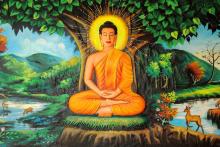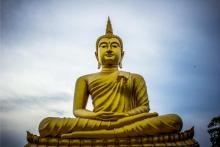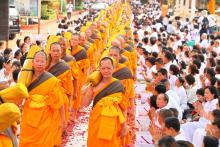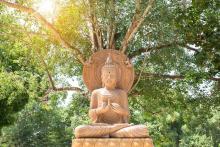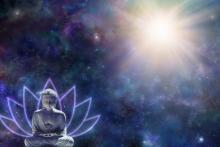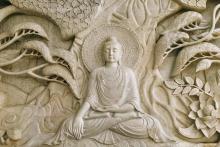Buddhism
Buddhism is a philosophy/religion created by Siddhartha Gautama (Buddha) over 2,500 years ago, founded on Hindu beliefs. Buddhism is the fourth most widely practiced religion in the world with over 500 million followers worldwide. The largest majority is 250 million in China and over 200 million in India with approximately 3-4 million in the U.S. There are two major sects: Mahayana and Theravada.
While there are many different traditions, the fundamental beliefs are typically the same. Buddha (enlightened one) was not a god and Buddhism is not a theistic religion. Buddhists look within themselves for the truth and understanding of Buddha's teachings believing in life after death, karma and reincarnation. Many of the elements of Buddhism are also practiced by non-buddhist. The idea behind the Buddhist beliefs is to liberate beings from suffering through meditation, spiritual and physical labor, and good behavior to reach nirvana, an eternal state of perfect peace, happiness, and enlightenment.
The Basic Teachings of Buddha which are core to Buddhism:
The Three Universal Truths
- Truth of suffering: Everything in life is always changing and impermanent
- Truth of cause of suffering: Impermanence leads to suffering because possessions can be lost and won't make you happy
- Truth of path to end suffering: The self is not personal or unchanging.
The Four Noble Truths
- Dukkha: Suffering exists. Accept that all humans suffer and it is part of life. Suffering has many causes: loss, sickness, pain, failure, and the impermanence of pleasure.
- Samudaya: Greed and Desire are the cause of suffering. Suffering is due the desire to have and control things. It can take many forms: craving of sensual pleasures; the desire for fame; the desire to avoid unpleasant sensations, like fear, anger or jealousy.
- Nirodha: There is an end to suffering. Suffering ceases with the final liberation of Nirvana. The mind experiences complete freedom, liberation and non-attachment. It lets go of any desire or craving.
- Magga: In order to end suffering, you must follow the Eightfold Path.
The Noble Eightfold Path
- Right understanding and viewpoint - based on the Four Noble Truths
- Right values and attitude - compassion rather than selfishness, free oneself of ignorance and hate.
- Right speech - don't tell lies, avoid criticism and abusive speech, avoid gossip
- Right action - help others, live honestly, don't hurt others or harm living things, take care of the environment
- Right work - do something useful, avoid jobs which harm others and live honestly
- Right effort - encourage good, helpful thoughts, discourage unwholesome destructive thoughts
- Right mindfulness - be aware of your feelings, thoughts and actions
- Right concentration & focus - calm mind, practice meditation
The Five Precepts
These are rules to live by similar to the Christian and Judaism 10 Commandments. The difference is, these are not a command, only recommendations for people to use their own intelligence and make their own choices.
- Do not harm or kill living things. No violence.
- Do not steal or take things that are not freely given.
- Do speak unkindly or tell lies.
- Do not misuse sex or commit adultery.
- Do not consume alcohol or other drugs. Do not do anything that removes you from reality for some this may include movies, television, Internet.
Buddhist Holidays & Festivities
Buddhists celebrate numerous holidays that, with the exception of the Japanese, use the lunar calendar, which is why many of the dates change from year to year. Many Buddhist festivals vary in different countries, cultures, ethnic groups and traditions.
Buddhist Holidays & Festivals are always joyful occasions. Most are dates set aside to commemorate birthdays and customs of the Buddhism faith. The most significant celebration is Buddha Day which happens every May on the night of the full moon, when Buddhist all over the world celebrate the birth, enlightenment and death of the Buddha over 2,500 years ago.



